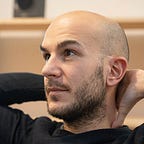OKR: Focus on Success and Achieve Ambitious Goals
OK….what?!
OKR, which stands for Objectives and Key Results, is a goal management methodology that is becoming increasingly popular. It is a framework that helps individuals and organizations focus on the most important results, measure their progress, and above all, stay updated.
OKRs were born in the 1970s thanks to Andy Grove, the CEO of Intel. Since then, this methodology has climbed the heights of the business world, becoming indispensable for many companies worldwide. Their flexibility and adaptability have made them a fundamental pillar for growing businesses. They originated from the need to provide a management method focused on key priorities.
Intel’s early OKRs were very simple:
Objective: Become the leader in the microprocessor market.
Key Result: Increase revenue by 10%.
Over the years, OKRs have evolved and have been adopted by many other companies, including Google, Netflix, and Spotify. These companies embrace OKRs because they offer a perfect combination of strategy, focus, and accountability, leading to uncompromised success. The clarity of objectives and measurability of results provide precise guidance for the entire organization. Additionally, OKRs promote a culture of accountability, where every team member is responsible for their contribution to company results.
Setting OKRs as a Davinci Team
In our team, we work together to define objectives and key results. We remove the pressure of numbers from the objectives and focus on the impact we want to create. We involve all members to make them feel an integral part of the process.
We set an objective for each product and establish 3–5 Key Results. These key results aim to be as inclusive as possible, involving all different roles within the team, from marketing to engineering. We gather monthly to review progress, and at the end of each quarter, we conduct a retrospective before embarking on the new cycle.
Every decision we make is a step toward our grand goal: business success. DaVinci’s prioritization framework dictates that every initiative is linked and evaluated based on its contribution to the OKRs, ensuring alignment and maximum operational efficiency.
Don’t try this at home if…
- You’re not ready for a rigorous framework. OKRs require a certain level of commitment and discipline. If you’re not prepared for such a rigorous framework, you might want to consider other options.
- Your organization isn’t ready for OKRs. OKRs work best in organizations that have a culture of collaboration and transparency. If your organization isn’t ready for this, you might want to wait before implementing OKRs.
Some little tricks and lessons learned from mistakes
- Avoid using business plan economic objectives: first define your objective, which is the “what,” and then your Key Results, which are the indicators of “how”. Making money can’t be the only reason for being.
- Focusing on the quarter’s objective without thinking about the next one: if you have a Key Result, you risk focusing on achieving that and starting from scratch in the next cycle.
- Setting Key Results that are either too easy or impossible: Key Results should be challenging and motivating. When defining them, you shouldn’t have certainty of achieving them, but they shouldn’t be seen as Mission impossible (unless you’re Tom Cruise).
- Setting Key Results without supporting data: it can happen, especially with the launch of a new feature, that you don’t have numbers to set Key Results to achieve. If you can’t provide a number with a rationale, don’t do it :)
And the final advice is, as always, to try, fail, and try again. There’s no one-size-fits-all solution, but finding your own method is crucial, and it’s different according to each team!
